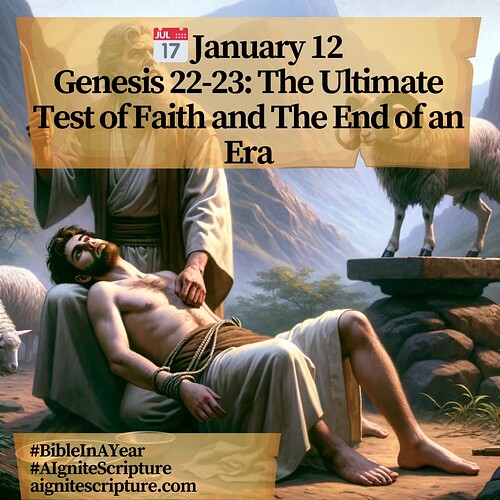 January 12: Genesis 22-23: The Ultimate Test of Faith and The End of an Era
January 12: Genesis 22-23: The Ultimate Test of Faith and The End of an Era
Unveiling Abraham’s Faith and Sarah’s Legacy
 Introduction
Introduction
Today, we explore the profound narratives of Genesis 22 and 23, where we encounter one of the most challenging tests of faith in the Bible and the closing of a significant chapter in the life of Abraham and Sarah. These chapters are pivotal in understanding the depth of faith and the human response to divine promises.
 Genesis 22: The Binding of Isaac
Genesis 22: The Binding of Isaac
Genesis 22 presents the harrowing story of God testing Abraham’s faith by asking him to sacrifice his son Isaac. This intense narrative not only tests Abraham’s faith but also symbolizes God’s future sacrifice in Christianity.
Key Verse: “Then he reached out his hand and took the knife to slay his son.” — Genesis 22:10
 Genesis 23: The Death of Sarah
Genesis 23: The Death of Sarah
In Genesis 23, we mourn the death of Sarah and witness Abraham’s grief. This chapter is not just about loss but also about Abraham’s respect and love for Sarah, as he seeks a burial place, marking the end of an era in their journey.
Key Verse: “Sarah lived to be a hundred and twenty-seven years old. She died at Kiriath Arba (that is, Hebron) in the land of Canaan.” — Genesis 23:1-2
 Key Themes and Reflections:
Key Themes and Reflections:
Faith and Obedience: Genesis 22 challenges us to consider the depth of our faith and obedience, as demonstrated by Abraham’s willingness to sacrifice Isaac.
Divine Testing and Provision: The story of Isaac’s binding underscores God’s testing of our faith and His provision in times of need.
End of Life and Honoring Loved Ones: Genesis 23 reminds us of the inevitability of death and the importance of honoring our loved ones with dignity and respect.
 Today’s Application:
Today’s Application:
Reflect on the times when your faith was tested and how you responded. Contemplate the significance of trusting in God’s provision, even in seemingly impossible situations. Consider how you honor and remember those who have passed away in your life.
 Hidden Gem:
Hidden Gem:
Did you know? The binding of Isaac, also known as the Akedah, has been a focal point of theological discussions in Judaism, Christianity, and Islam.
 Reflective Q&A:
Reflective Q&A:
![]() Genesis 22: The Binding of Isaac
Genesis 22: The Binding of Isaac
![]() Understanding Abraham’s Test of Faith: How does Abraham’s willingness to sacrifice Isaac challenge and inspire your understanding of faith?
Understanding Abraham’s Test of Faith: How does Abraham’s willingness to sacrifice Isaac challenge and inspire your understanding of faith?
A: Abraham’s readiness to sacrifice Isaac challenges us to examine the depth of our faith and reliance on God. It inspires us to trust in God’s plans, even when they are beyond our understanding, and to be willing to make sacrifices in obedience to Him.
![]() The Symbolism of Sacrifice: What does the binding of Isaac symbolize in the broader context of faith and divine promise?
The Symbolism of Sacrifice: What does the binding of Isaac symbolize in the broader context of faith and divine promise?
A: The binding of Isaac symbolizes the ultimate test of faith and the notion of surrendering what is most precious to us. It foreshadows the Christian belief in God’s sacrifice of His own Son, reflecting the depth of divine love and mercy.
![]() Genesis 23: The Death of Sarah
Genesis 23: The Death of Sarah
![]() Coping with Loss and Honoring Memory: What can we learn from Abraham’s actions following Sarah’s death?
Coping with Loss and Honoring Memory: What can we learn from Abraham’s actions following Sarah’s death?
A: Abraham’s actions following Sarah’s death teach us about coping with loss with grace and dignity. He honors her memory by securing a burial place, showing respect and love, and setting an example for how we can cherish and honor our loved ones even in death.
 Join the Discussion:
Join the Discussion:
How do these chapters from Genesis affect your perspective on faith, sacrifice, and remembrance? Share your reflections and personal experiences in the comments below!
genesis #Abraham #Faith #Sacrifice #Legacy #BibleStudy #SpiritualJourney
![]() See You Tomorrow in Genesis: Join us as we continue to explore the rich narratives of Genesis, unveiling deeper meanings and lessons for our spiritual growth.
See You Tomorrow in Genesis: Join us as we continue to explore the rich narratives of Genesis, unveiling deeper meanings and lessons for our spiritual growth.
 Join the forum!
Join the forum!
Join our AIgniteScripture Community for a deeper dive into biblical studies:
Free Members: Participate in engaging discussions, access a wealth of biblical resources, and connect with a community of faith. Register here: 🌟 How to Join Page - Membership Options
Supporters Membership ($20/month or $200/year): Gain access to exclusive content, personalized newsletters, and a supportive community. Enhance your spiritual journey with us: 🌟 How to Join Page - Membership Options
![]() Stay Connected with our AIgniteScripture Newsletter: Stay updated with our daily readings and insights. Be a part of our journey through the Bible, enriched by AI perspectives. Subscribe now: https://newsletter.aignitescripture.com/
Stay Connected with our AIgniteScripture Newsletter: Stay updated with our daily readings and insights. Be a part of our journey through the Bible, enriched by AI perspectives. Subscribe now: https://newsletter.aignitescripture.com/
